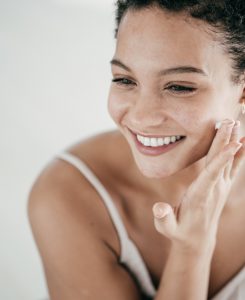Our sense of smell is 10 thousand times more sensitive than our other senses – the invisible world of scent surrounds us with powerful influences. Think of familiar smells – peppermint, rose, sweet basil, cedar – and how each one inspires different feelings, emotions, even memories.
The oils used in aromatherapy are completely unlike synthetic fragrances. Pure essential oils are natural compounds derived from plants and their biochemical composition has a profound effect upon us – mentally, emotionally and physically, and therefore, they can positively impact our wellbeing.
My three essential oil must-haves
Lavender
This is the most widely used oil in aromatherapy. It is used to relieve anxiety, reduce stress levels, unwind, relax and improve your night’s sleep.
Tea tree
This is the oil for fighting infections, and for reducing acne outbreaks and acne scars. It works well to soothe itchy skin, cuts, and burns. Tea tree also supports immune function.
Peppermint
Peppermint essential oil is the most popular of the mint oil varieties. It is ideal for keeping you alert and focused. This oil is also excellent for digestive health and can be used to combat irritation and allergies.
Important safety tips for essential oils:
• Always read and follow all label warnings and cautions.
• Always keep oils tightly closed and out of the reach of children.
• Never ingest essential oils.
• Don’t use undiluted oils on your skin. Dilute oils with vegetable or nut oils – unless nut allergies are present.
• Keep oils away from eyes and mucous membranes to avoid irritation.
• Patch test oils before using. If in doubt, dilute a small amount and apply to the skin of your inner arm and leave for 24 hours. Do not use if redness or irritation occurs.
• Use oils with great caution if pregnant – refer to a fully trained aromatherapist for advice.
While it is safe to use most oils at home – observing the guidelines above – there is no substitute for a professional aromatherapy treatment. Please ensure that you only seek treatment from a qualified practitioner.
You’ll find a searchable list of fully qualified, insured, registered aromatherapists at The Complementary Medical Association website: The-CMA.org.uk .
If you would love to train to become a qualified aromatherapist, you’ll find a list of CMA accredited training schools, on the site.
Jayney Goddard is president of the Complementary Medical Association. Find out more at the-cma.org.uk. Sign up for Jayney’s 21-Day Rewind Plan and track your own biological age progression at JayneyGoddard.com
Article by
Jayney Goddard
President of the Complementary Medical Association
is the president of the Complementary Medical Association
Discover more
Article by
Jayney Goddard
President of the Complementary Medical Association
is the president of the Complementary Medical Association
Discover more


 By Jayney Goddard
By Jayney Goddard 




















